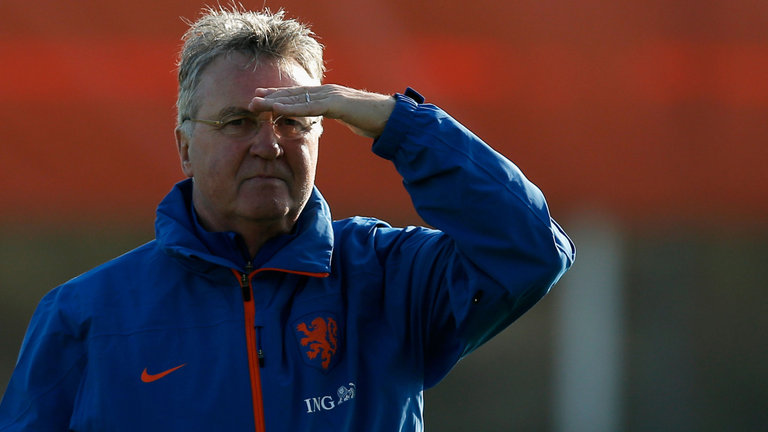
Guus
Hiddink is set for talks with Chelsea about taking over until the end of the
season following the sacking of Jose Mourinho on Thursday. Here, we profile
the experienced Dutch coach and examine his record before and after his
first stint at Stamford Bridge...
Lifting the FA Cup in 2009 was bittersweet for Chelsea's players. The 2-1
win over Everton ensured a problematic season ended with a parading of
silverware under the Wembley arch, but it also marked the end of Guus
Hiddink's fleeting spell in charge.
The Dutchman had become a hugely popular figure at the club after taking
over from Luiz Felipe Scolari in February of that year. In the months that
followed, Petr Cech, Michael Ballack and John Terry had led the calls for
him to stay, but Hiddink had vowed to continue in his role as Russia manager
and their pleas fell on deaf ears. "I realised I was wasting my breath after
the 20th time of asking," recalled Terry at the time.
Chelsea's players showed their appreciation by clubbing together for a
£200,000 Rolex watch as a parting gift. It showed the special bond Hiddink
had formed with his squad, and winning the FA Cup wasn't his only
achievement.
Hiddink had steadied the ship after Scolari's chaotic tenure, and if it
wasn't for Andres Iniesta's stoppage-time strike at Stamford Bridge he would
have taken them to the Champions League final too. Hiddink only lost one of
his 22 games in charge, and his 73 per cent win ratio remains the best of
any manager in Chelsea's history.
Hiddink, a midfielder in his playing days, was already vastly experienced
when he took the Chelsea job. At international level he had had success with
Netherlands, South Korea and Australia as well Russia, but his first role in
management started at PSV Eindhoven in 1987.
In two glittering stints at the Dutch club, Hiddink won six Eredivisie
titles, four Dutch Cups and the 1988 European Cup. In between those
successes, he spent time in charge at Fenerbahce, Valencia, Real Madrid and
Real Betis, where his achievements were more modest, with the 1998
Intercontinental Cup with Real Madrid his only piece of silverware in that
time.
Terry, John Obi Mikel and Branislav Ivanovic are the only Chelsea players
who remain at the club from 2009, but Roman Abramovich will be hoping
Hiddink can have the same kind of impact on and off the pitch.
His record since leaving the Blues, however, has been patchy at best. A few
months after leaving Stamford Bridge, Hiddink's Russia were denied a place
at the 2010 World Cup after an unexpected play-off defeat by Slovenia.
Hiddink left his post in June 2010 and immediately took charge of Turkey,
but he resigned after they failed to qualify for Euro 2012.
He resurfaced at Russian side Anzhi Makhachkala in February 2012, signing an
18-month contract for his first permanent club position in six years.
Hiddink steered the club from mid-table to third place in his second season,
but he unexpectedly resigned just two games into the 2013/14 campaign.
In March 2014, Hiddink succeeded Louis van Gaal for his second spell as
Netherlands manager. There was no repeat of his success in his first stint,
however, and he resigned in June 2015 after a poor start to their Euro 2016
qualifying campaign.
"I am sorry that it went this way," said Hiddink.
"I thought it was an honour to again coach the Dutch national team and I
wish my successor, the staff and the players every success on the way to the
European Championships in France."
In total, Hiddink won just four of his 10 games in charge, and the
Netherlands were unable to salvage their Euro 2016 qualifying campaign under
his replacement Danny Blind.
But while Hiddink's recent record does not inspire much confidence, the
memories of his first stint at Chelsea are not forgotten in west London. If
he can come close to matching those achievements, Terry might find himself
asking a familiar question.
 top
top top
top Guus
Hiddink is set for talks with Chelsea about taking over until the end of the
season following the sacking of Jose Mourinho on Thursday. Here, we profile
the experienced Dutch coach and examine his record before and after his
first stint at Stamford Bridge...
Guus
Hiddink is set for talks with Chelsea about taking over until the end of the
season following the sacking of Jose Mourinho on Thursday. Here, we profile
the experienced Dutch coach and examine his record before and after his
first stint at Stamford Bridge...